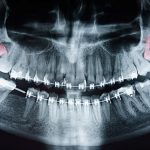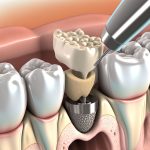We tend to think of general dentists for any dental and oral issues, but certain conditions may require a maxillofacial surgeon.
The maxillofacial surgeon is a dentist specialized in oral and maxillofacial surgery, specifically trained to treat jaw and facial structure disorders, diseases, injuries and abnormalities. They are also responsible for correcting facial deformities.
When should you see a maxillofacial surgeon? Here are a few examples.
Dental implant placement
Filling gaps in teeth is important following the loss of one or more teeth. Dental implants have proven to be the best way to restore natural appearance, comfort and functionality.
Dental implant placements require a thorough understanding of mouth, teeth, jaw and facial function and aesthetics.
If you lose one or more of your teeth, consult a maxillofacial surgeon so they can assess your condition and recommend the appropriate treatment.
Wisdom teeth removal
Wisdom teeth used to be very practical. Nowadays they’ve lost their usefulness and their growth can lead to major pain and other complications.
Wisdom teeth must sometimes be removed to prevent the onset of more serious oral diseases. In this situation, you should see a maxillofacial surgeon.
The maxillofacial specialist will perform a clinical oral examination and use panoramic or 3D radiology of the jaw to determine if wisdom teeth removal is necessary.
Complex extractions
Most tooth extractions are simple, but complex extractions can also occur. This is often the case when patients have anatomical or medical conditions that increases the risk of the operation.
For example, you would need to consult a maxillofacial surgeon if you fractured a tooth that must be removed. A dentist may also recommend consulting a maxillofacial surgeon if you take blood thinning medication.
Oral pathologies
Some oral pathologies can affect the mouth or jaw: soft tissue lesions, bone lesions, malignant tumours and cancers. Maxillofacial surgeons are trained to recognize and manage most orofacial lesions and pathologies.
Your dentist may therefore recommend consulting a maxillofacial surgeon if they believe a particular oral pathology was detected during a dental checkup.
TMJ disorders
The temporo-mandibular joint (TMJ) is your body’s most used joint. It moves every time you eat, talk or open your mouth.
The TMJ can undergo different mechanical dysfunctions or joint and muscle pain. You should probably see a maxillofacial surgeon if you feel any TMJ disorder, pain or discomfort. They will evaluate your condition and recommend appropriate treatment.
Maxillofacial surgeons at the service of your oral health
General dentists can do a lot, but some situations require the assistance of a maxillofacial surgeon. For any of the above situations, seek the expertise of a maxillofacial surgeon.
For more information on the difference between a general dentist and maxillofacial surgeon, we encourage you to read our article on the topic.
To know more about maxillofacial surgery specializations, browse our services.




